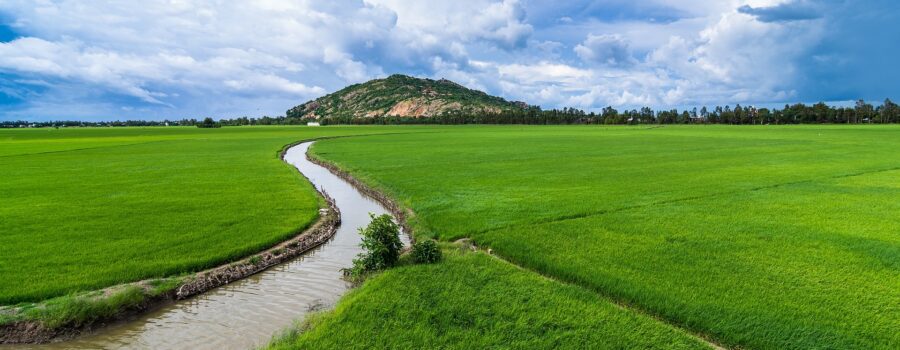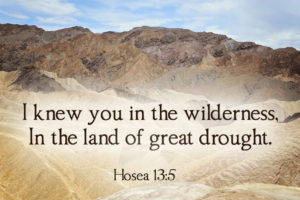In my last post we considered the land where Abraham dwelled—namely, the land of Canaan—and we concluded from scriptural evidences that it was a place of divine dependence. In this present post we will look to the plain of Jordan where Lot relocated himself.
And Lot lifted his eyes and saw all the plain of Jordan, that it was well watered everywhere (before the Lord destroyed Sodom and Gomorrah) like the garden of the Lord, like the land of Egypt as you go toward Zoar. 11 Then Lot chose for himself all the plain of Jordan, and Lot journeyed east. And they separated from each other. 12 Abram dwelt in the land of Canaan, and Lot dwelt in the cities of the plain and pitched his tent even as far as Sodom.” (Genesis 13:10–12)
The plain of Jordan
The verses mentioned above state clearly that the plain of Jordan was, at the time, well watered everywhere. It is compared to the garden of God which was situated in the plain of the Euphrates, or to the land of Egypt. In brief, the plain of Jordan was also a place of self-sufficiency, a land where a person could gather a good harvest regardless of his moral condition. This is the land Lot chose for himself. As you can see, it’s possible to leave the plain of the Euphrates and end up in the plain of Jordan—the latter being much closer to the land of God yet utterly dissociated from it. I suggest we evangelicals are facing the same risk today. We can leave the plain of the Euphrates (the land of the old man) and settle in the plain of Jordan (the land of self-reliance). That’s right! We can organize our life in such a way that God becomes dispensable. Present or absent, near or far, nothing really matters; we can cruise through life successfully irrespective of our moral condition.
The problems with the plain of Jordan
The first thing we must realize is that the plain of Jordan was a place where the seekers of ease congregated, and since the morality of an individual didn’t affect his prosperity it was also a place where sinners flocked. With God or without Him its inhabitants could manage quite well.
Another problem resided in the fact that God doesn’t dwell in the plains. He dwells in the mountains.
And the Lord said, “Because the outcry against Sodom and Gomorrah is great, and because their sin is very grave, 21 I will go down now and see whether they have done altogether according to the outcry against it that has come to Me; and if not, I will know.” (Gen. 18:20,21)
Here we see that God didn’t dwell in the plain. In other words, He was not associated with its lifestyle.
This is confirmed by the following verses:
“You will bring them in and plant them in the mountain of Your inheritance, in the place, O Lord, which You have made for Your own dwelling, the sanctuary, O Lord, which Your hands have established.” (Exodus 15:17)
“And Moses went up to God, and the Lord called to him from the mountain, saying, “Thus you shall say to the house of Jacob, and tell the children of Israel”. (Exodus 19:3)
“Now it shall come to pass in the latter days that the mountain of the Lord’s house shall be established on the top of the mountains, and shall be exalted above the hills; and all nations shall flow to it. 3 Many people shall come and say, “Come, and let us go up to the mountain of the Lord, to the house of the God of Jacob; He will teach us His ways, and we shall walk in His paths.” For out of Zion shall go forth the law, and the word of the Lord from Jerusalem.” (Isaiah 2:2,3)
“Even them I will bring to My holy mountain, and make them joyful in My house of prayer” (Isaiah 56:7)
“I will bring forth descendants from Jacob, and from Judah an heir of My mountains; My elect shall inherit it, and My servants shall dwell there.” (Isaiah 65:9)
So God dwells on the mountains. It follows that the one who wants to get there will have to leave the plain, i.e., the land of self-sufficiency, and trust in God’s provision. In other words, he will have to be a disciple, not a mere convert or proselyte.
What about us
The story of Abraham and Lot is obviously emblematic. It demonstrates a reality that still subsists today. We can say and say truly: There are two kinds of Christians, viz., those who live an independent life and those who live a dependent life. How can one tell the difference between the two you may ask? The former will easily indulge in a lukewarm spiritual state, for there is little or no fear of God in his heart. In absolute contrast, the latter pays attention to the divine voice. His very manners attest his awareness of vulnerability. You will see him following hard after God as one who cannot manage on his own. Hence, he will slowly ascent to a place where man’s sufficiency can no longer breathe. As we will see in my next post, he will actually live a life the independent Christian fears, and will remain composed in spite of lurking calamities. This is the portion of the one dwelling in God’s holy mountain, there where everything depends of what comes down from heaven. Ultimately the question is: Do I dwell there?
If you think this post can help somebody you can share it with one of the options presented bellow.
Where do you dwell? (Part three)













